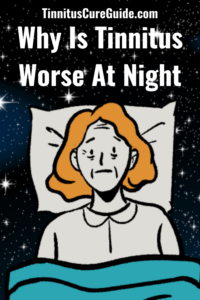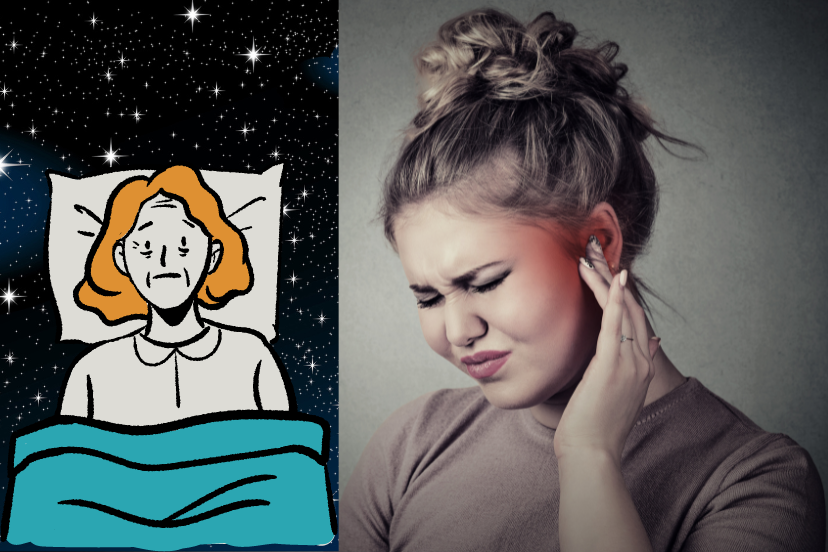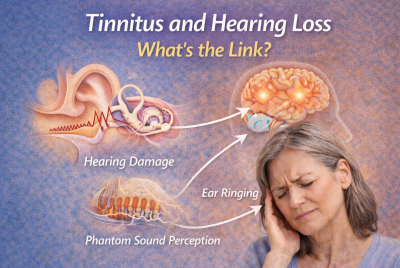Why Is Tinnitus Worse At Night
Uncover why is tinnitus worse at night. Discover coping strategies and the factors that amplify this symptom in the quiet hours. Living with tinnitus can be challenging, particularly when the symptoms intensify during nighttime. As someone passionate about hearing health and eager to provide helpful suggestions, I understand the struggles that many individuals face when trying to get a good night’s sleep. In this “Why is tinnitus worse at night” article, I aim to shed light on why tinnitus worsens at night and provide helpful suggestions to alleviate its impact on your sleep and overall well-being.
Introduction
Tinnitus refers to the perception of sound in the absence of any external source. It is commonly described as ringing, buzzing, hissing, or whistling noises in the ears. While tinnitus can be a temporary condition caused by exposure to loud noises or certain medications, it can also become a chronic issue for some individuals. Understanding the factors that contribute to the worsening of tinnitus at night can help us develop effective coping strategies.
What Is Tinnitus?
Before delving into the reasons behind nighttime tinnitus, let’s briefly explore what tinnitus is. Tinnitus can manifest in various forms, ranging from a mild annoyance to a debilitating condition. It is often associated with underlying hearing loss, but it can also occur without any measurable hearing impairment. Tinnitus can affect one or both ears and may be continuous or intermittent.
Why Does Tinnitus Spike At Night
Tinnitus often spikes at night due to the quieter environment, making the ringing or buzzing more noticeable. Additionally, fatigue, stress, and anxiety levels can rise when trying to sleep, intensifying tinnitus perception. Lying down might increase blood flow to the head, potentially exacerbating some symptoms. The absence of daytime distractions also makes tinnitus more prominent.
Tinnitus At Night Causes
Tinnitus can become more noticeable and bothersome at night for various reasons:
- Quiet Environment: In the absence of daytime ambient sounds, tinnitus can become more prominent.
- Fatigue: Being tired can exacerbate the perception of tinnitus.
- Stress and Anxiety: Both can intensify tinnitus, and many people find their stress levels rise when trying to fall asleep.
- Position: Lying down might increase blood flow to the head, potentially heightening tinnitus for some individuals.
- Hearing Loss: Tinnitus often accompanies hearing loss, which can make external sounds less audible and internal sounds more noticeable at night.
- Medications: Some medications can cause tinnitus or make it worse, and the effects might be more noticeable when other distractions are minimal.
Consulting with a healthcare professional can help pinpoint specific causes and solutions.
Tinnitus Is Worse When Tired
Tinnitus often becomes more pronounced when an individual is tired. Fatigue can lower one’s threshold for irritation, making the ringing or buzzing sound more bothersome. Additionally, the brain’s ability to filter out irrelevant sounds diminishes when tired, amplifying the perception of tinnitus. Stress and anxiety, commonly associated with exhaustion, can intensify the symptom. Furthermore, tired individuals are more likely to be in quiet environments, like preparing for sleep, where the lack of external sounds makes tinnitus more noticeable. Prioritizing good sleep hygiene, managing stress, and addressing fatigue can be essential to mitigating the heightened perception of tinnitus during exhaustion.
Understanding Tinnitus At Night
Many individuals report that their tinnitus becomes more bothersome when trying to sleep at night. Several factors contribute to this phenomenon:
Silence Amplifies The Sound
When the surroundings become quiet during nighttime, the absence of external noise allows tinnitus sounds to become more prominent and noticeable.
Lack Of Distractions
During the day, engaging activities and ambient sounds can provide distractions from tinnitus. However, at night, when the world around us is quiet, our attention is more likely to focus on the internal soundscape.
Fatigue And Tiredness
After a long day, fatigue sets in, making it harder to ignore tinnitus sounds. The combination of physical and mental exhaustion can make tinnitus feel more overwhelming.
Increased Awareness
With fewer external stimuli competing for our attention, we become more aware of internal sensations, including tinnitus. This heightened awareness can make the perception of tinnitus more pronounced.
Tinnitus Sleeping Position
The sleeping position can influence the perception of tinnitus for some individuals. Here’s what to consider:
- Elevated Head Position: Lying flat might increase the perception of tinnitus for some due to increased blood flow to the head. Using an extra pillow to elevate the head can help in such cases.
- Side Sleeping: Sleeping on the side, preferably on the unaffected ear (if tinnitus is louder in one ear), can sometimes reduce the noise perception.
- Avoid Neck Strain: Ensure your neck isn’t at an awkward angle, as this can compress blood vessels and potentially exacerbate tinnitus.
- Relaxed Position: Find a comfortable position that promotes relaxation and eases anxiety or stress, as these can amplify tinnitus.
- Consistent Routine: A regular sleep routine with calming rituals can aid in managing tinnitus at night.
Trying different positions and observing changes can help identify the most comfortable posture.
Coping Strategies For Tinnitus At Night
While there is no definitive cure for tinnitus, there are several strategies you can employ to minimize its impact on your sleep and daily life. Here are some helpful suggestions:
Creating A Soothing Sleep Environment
Make your bedroom a haven of relaxation by keeping it dark, calm, and quiet. Consider using blackout curtains, earplugs, or a white noise machine to create a peaceful atmosphere conducive to sleep.
Masking The Sound
Soft background noises, such as gentle music, a fan, or nature sounds, can help mask the tinnitus sounds, providing relief and promoting better sleep.
Relaxation Techniques
Engage in relaxation practices, such as deep breathing exercises, progressive muscle relaxation, or meditation, to calm your mind and reduce stress levels.
Cognitive Behavioral Therapy (CBT)
CBT can help reframe negative thoughts and emotions associated with tinnitus, allowing you to develop a more positive and accepting mindset.
Managing Stress And Anxiety
Adopt stress-management techniques, such as regular exercise, engaging in hobbies, or seeking support from loved ones, to reduce the impact of stress and anxiety on tinnitus.
Lifestyle Changes To Alleviate Nighttime Tinnitus
In addition to coping strategies, certain lifestyle modifications can contribute to a more peaceful sleep despite tinnitus:
Limiting Caffeine And Alcohol Intake
Both caffeine and alcohol can interfere with sleep quality and exacerbate tinnitus symptoms. Limiting or avoiding these substances, particularly close to bedtime, may help improve your sleep.
Regular Exercise
Engaging in regular physical activity not only promotes better sleep but also reduces stress and enhances overall well-being. Incorporate moderate exercise, such as walking or swimming, into your daily routine.
Establishing A Sleep Routine
Going to bed and waking up at consistent times helps regulate your internal body clock, improving the quality of your sleep. Create a relaxing bedtime routine to signal your body that it’s time to unwind.
Using White Noise Or Calming Sounds
Experiment with different types of background noise, such as white noise or nature sounds, to find what works best for you in masking the ringing in the ears and promoting a restful sleep environment.
Avoiding Stimulating Activities Before Bed
Engaging in mentally or physically stimulating activities, such as working on electronic devices or exercising vigorously close to bedtime, can make it harder to fall asleep. Create a wind-down routine that involves relaxing activities instead.
Seeking Professional Help
If your nighttime tinnitus persists despite implementing coping strategies and lifestyle changes, it may be beneficial to seek professional assistance. Consider consulting an audiologist or hearing specialist who provides personalized guidance and recommends suitable treatments. Some options to explore include:
Tinnitus Retraining Therapy (TRT)
TRT aims to retrain the brain’s response to tinnitus by combining sound therapy with counseling. This long-term approach can help you habituate to tinnitus and reduce its impact on your life.
Sound Therapy Options
Various sound therapy techniques, such as wearing hearing aids, using tabletop sound generators, or utilizing smartphone apps, can provide relief by diverting your attention from ringing in the ears sounds.
Medications And Supplements
In some cases, medications or supplements may be prescribed to alleviate symptoms of ringing in the ears. Consult with a healthcare professional to determine whether these options suit you.
Alternative Therapies
Some individuals find relief from tinnitus through alternative therapies like acupuncture, hypnosis, or herbal remedies. While research on their effectiveness is limited, they may be worth exploring under the guidance of a qualified practitioner.
How Can I Stop Tinnitus At Night?
Tinnitus can become more pronounced at night. To alleviate it:
- White Noise Machines: They can mask tinnitus by providing a consistent ambient sound.
- Hearing Aids with Tinnitus Maskers: For those with hearing loss, certain hearing aids offer tinnitus masking features.
- Bedroom Environment: Ensure a calm, quiet setting. Soft background music or nature sounds can also be helpful.
- Limit Caffeine and Alcohol: These may exacerbate tinnitus for some people, especially close to bedtime.
- Stress-Reduction Techniques: Deep breathing, meditation, or progressive muscle relaxation can help.
- Positioning: Elevate your head slightly, as lying flat can sometimes increase tinnitus perception.
- Consult a Specialist: They might provide tailor-made solutions or therapies.
Seeking appropriate management strategies can lead to better sleep.
FAQs About Why Is Tinnitus Worse At Night
1. Can tinnitus at night be a sign of a more serious underlying condition?
Tinnitus itself is not typically a sign of a serious underlying condition. However, if you experience sudden or severe tinnitus, it’s advisable to consult a healthcare professional to rule out any potential underlying causes.
2. Will using headphones or earbuds worsen tinnitus at night?
Using headphones or earbuds at a moderate volume is generally safe. However, avoiding listening to excessively loud music or sounds is essential, as this can potentially worsen tinnitus symptoms.
3. Can stress management techniques really help with tinnitus?
Yes, stress management techniques, such as relaxation exercises, mindfulness, or engaging in enjoyable activities, can help reduce the impact of stress on tinnitus. By managing stress, you may experience a decrease in the intensity of tinnitus symptoms.
4. Are there any dietary changes that can alleviate nighttime tinnitus?
While no specific diet can cure tinnitus, some individuals find that reducing their intake of caffeine, alcohol, and salty foods can help reduce the severity of ear-ringing symptoms.
5. Is there a cure for tinnitus?
Currently, there is no known cure for ear ringing. However, various management strategies, treatments, and lifestyle modifications can help individuals effectively cope with and minimize the impact of tinnitus on their daily lives.
Why Is Tinnitus Worse At Night – Conclusion
While tinnitus can be particularly bothersome at night, there are numerous strategies you can employ to manage its impact on your sleep and overall well-being. By creating a soothing sleep environment, practicing relaxation techniques, making lifestyle modifications, and seeking professional help when needed, you can significantly reduce the distress caused by nighttime tinnitus. Remember, each person’s experience with tinnitus is unique, so it may take some trial and error to find the approaches that work best for you.
Disclaimer
This article is for informational purposes only and does not substitute professional medical advice. Always consult a licensed healthcare provider before beginning new treatments, supplements, or exercise programs for tinnitus or related conditions.







